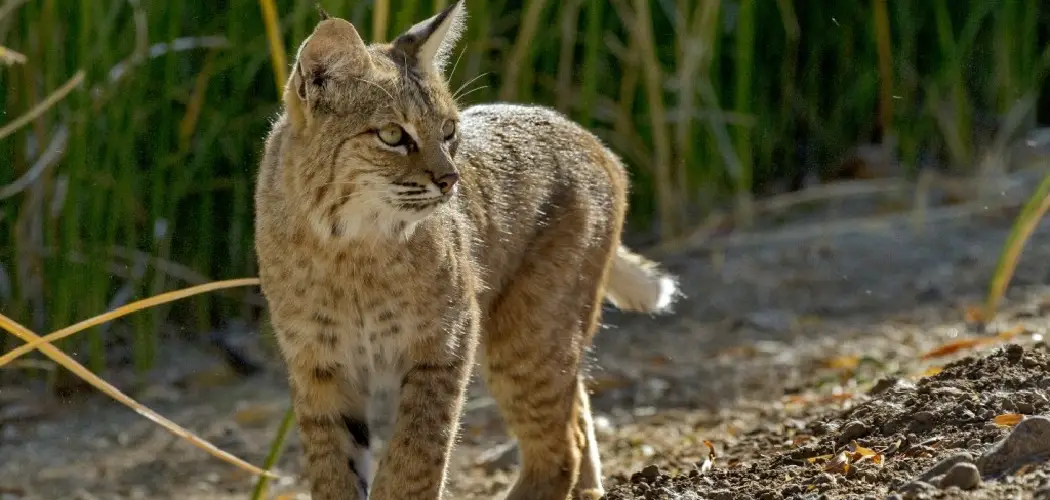Are bobcats becoming a nuisance in your yard? If so, you’re not alone! Bobcats are increasingly being spotted near homes across the country. Once considered mainly nocturnal animals found only in lonely forests, these wild predators are now regularly seen prowling through suburban backyards in search of food and cover.
While they don’t pose any real danger to humans, bobcats can wreak havoc on your outdoor landscape and interfere with the beauty of your property – unless you know how to keep them away!
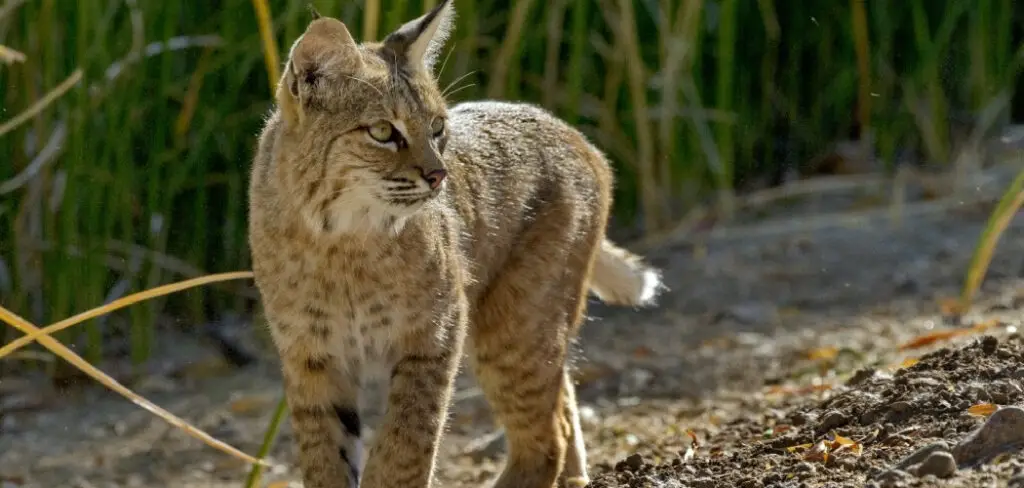
Bobcats are generally shy and elusive, but that doesn’t mean they won’t come near your home. They are attracted to residential areas because of the abundance of prey, such as rodents and rabbits, as well as potential shelter in sheds or under porches.
In this blog post, we’ll talk about practical tips for how to keep bobcats away from your yard.
What Will You Need?
Before we dive into the specific strategies, let’s first go over what you’ll need to get started. These items are essential for implementing any of the methods mentioned in this blog post:
- Motion-activated sprinklers or lights
- Fencing materials (such as chicken wire)
- Secure trash bins
- Predator urine or scat repellent
Once you have these items ready, you can act to keep bobcats at bay.
10 Easy Steps on How to Keep Bobcats Away From Your Yard
Step 1. Install Motion-Activated Sprinklers or Lights:
Bobcats are nighttime hunters, and sudden changes in their surroundings can startle them away. Install motion-activated sprinklers or lights around the perimeter of your yard.
These devices will activate when a bobcat comes near, spraying water or shining a bright light, which should discourage the bobcat from lingering. If you have a larger property, consider purchasing multiple units for better coverage.
Step 2. Secure Trash Bins:
Bobcats are opportunistic eaters and will rummage through your trash if given the chance. To prevent this, ensure your trash bins are secure and cannot be easily opened by animals.
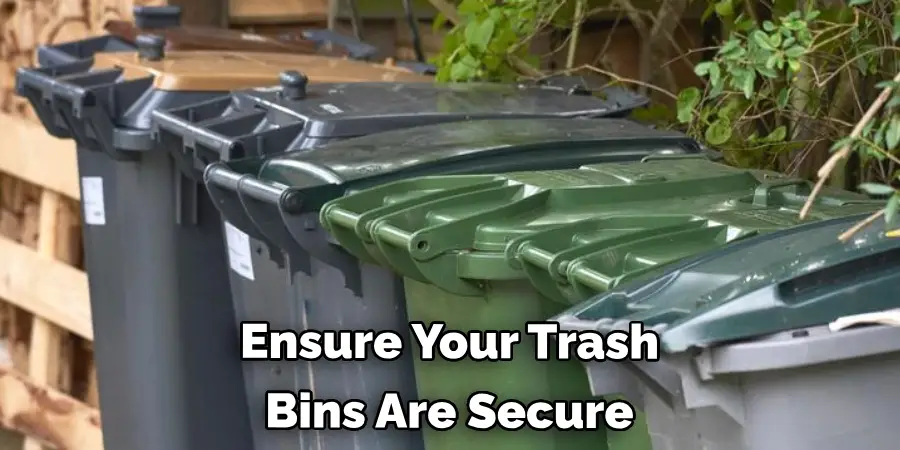
Use bungee cords or other restraints to keep the lids tightly closed. Additionally, avoid putting out your trash until the morning of pick-up to minimize the time it’s left outside.
Step 3. Use Predator Urine or Scat Repellents:
Bobcats are naturally afraid of larger predators. Use this to your advantage by spreading predator urine or scat repellents around your yard. These repellents mimic the scent of larger predators like coyotes or cougars, tricking the bobcat into thinking that a dangerous enemy is nearby. The bobcat will likely avoid your property, seeking safer territories.
These repellents can be purchased online or at local gardening or home improvement stores. Always follow the instructions for safe use as provided by the manufacturer.
Step 4. Install Fencing:
Bobcats are excellent climbers, but they’re less likely to scale tall fences. So, erect a sturdy fence around your yard at least six feet high, with a top extension that angles outward to discourage climbing.
In addition to that, the fence should also extend at least a foot underground to prevent the bobcat from digging under. Using chicken wire or similar materials can be an affordable and effective solution. A well-installed fence will not only keep bobcats away but also protect your yard from other potential intruders.
Step 5. Remove Potential Shelter:
Bobcats are drawn to places where they can find shelter, such as under porches, in sheds, or in thick vegetation. Inspect your yard and remove any potential bobcat hideaways.
Clean up piles of wood or debris, and trim or remove dense shrubs. If you have a porch or a deck, consider enclosing it with lattice or fencing to prevent bobcats from taking refuge underneath. By eliminating these potential shelters, you make your yard less inviting for bobcats.
Step 6. Limit Food Sources:
Bobcats are often attracted to homes due to food availability, whether it’s unsecured garbage, pet food, or even small pets themselves. To deter bobcats, it’s crucial to limit these accessible food sources. Never leave pet food outside overnight, and always supervise small pets when they’re outside.
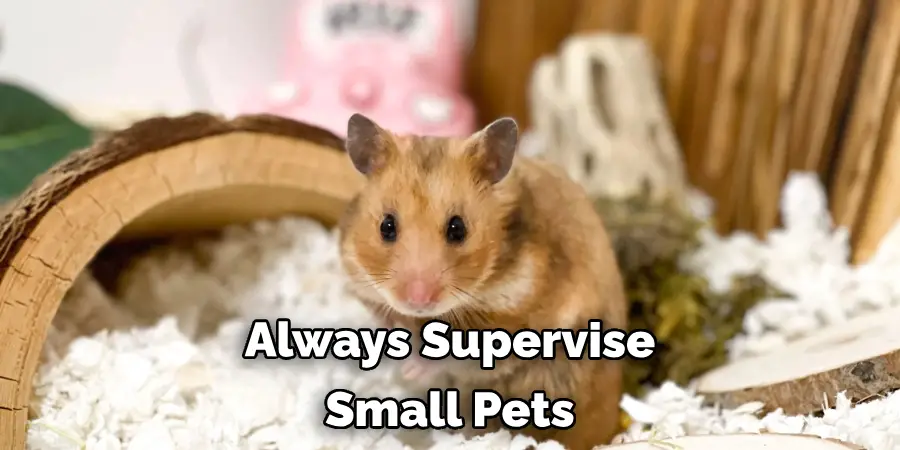
If you have bird feeders, place them high up where bobcats can’t reach. Additionally, managing the population of rodents, rabbits, and other small wildlife in your area can also discourage bobcats, as these creatures are a primary food source for them. By minimizing food sources, you make your yard less attractive to these predatory animals.
Step 7. Use Noise Deterrents:
Bobcats are timid creatures that are generally wary of humans. Therefore, sudden or unfamiliar noises can often scare them away. Implement noise deterrents in your yard, such as motion-activated sound alarms or even a radio turned on low.
These unexpected sounds can startle bobcats and discourage them from staying on your property. Remember to change the location and type of noises regularly, as bobcats can grow accustomed to repeated sounds.
Step 8. Keep Pets Indoors At Dusk and Dawn:
Bobcats are crepuscular, meaning they are most active around dusk and dawn. This is also when pets, particularly small ones, are at the most significant risk.
To safeguard your pets, keep them indoors during these hours. If you must let your pet outside, make sure to supervise them. Also, consider installing a secure outdoor enclosure or “catio” for cats. These precautions can help deter bobcats from visiting your yard for a meal.
Step 9. Regularly Check and Maintain Your Yard:
Consistent yard maintenance is vital in discouraging bobcats. Regularly check for signs of bobcat activity, such as tracks, droppings, or partially eaten prey. If you notice any such signs, take immediate action to enhance your deterrent measures.
Keep your yard clean and free of potential food sources. Regularly trim vegetation, remove fallen fruit from trees, and secure all possible entrances to your home. By doing so, you can discourage bobcats from considering your yard as a potential hunting ground.
Step 10. Consult with Local Wildlife Experts:
If you need help with persistent bobcat visits despite implementing these measures, it may be time to consult with local wildlife experts or pest control services.
They can provide professional advice tailored to your situation and even help with humane trapping and relocation if required. Remember, it’s essential to handle this issue responsibly and humanely, as bobcats play a vital role in our ecosystem by controlling rodent populations.
Always follow local wildlife regulations and guidelines when dealing with bobcats.
By following these steps, you can effectively keep bobcats away from your yard and ensure the safety of both yourself and these beautiful creatures.

5 Additional Tips and Tricks
- If you have small pets, such as cats or dogs, bring them indoors at night. Bobcats are nocturnal animals and are more active during the night.
- Keep your garbage cans securely closed and away from areas where bobcats may wander. These animals are attracted to food sources and may be tempted by the smell of food in your garbage.
- Keep a close eye on your bird feeders. Bobcats are skilled climbers and may be able to access bird feeders that are hung too low or placed near trees.
- If you have a compost pile, keep it contained and covered. The smell of decomposing food can also attract bobcats.
- Invest in quality fencing around your yard. Bobcats are excellent jumpers and can easily scale a standard chain-link fence. Consider installing an electric or barbed wire fence to keep them out.
These additional tips and tricks can help further reduce the chances of bobcats wandering into your yard.
5 Things You Should Avoid
- Avoid planting attractive vegetation: Certain plants can attract prey animals like rabbits and birds that bobcats prey on. Try to avoid planting these in your yard.
- Avoid allowing your pets to roam freely: Keeping your pets indoors, especially during the twilight hours when bobcats are most active, can help prevent encounters.
- Avoid creating hiding spots: Bobcats prefer areas where they can hide, such as undergrowth, brush, or cluttered spaces. Keeping your yard clean and clear helps remove potential hiding spots.
- Avoid feeding wildlife: Feeding other wildlife can attract bobcats as well. Ensure your bird feeders are high enough not to be accessed by bobcats and keep food in for other wildlife.
- Don’t approach or try to tame a bobcat: Bobcats are wild animals and should be treated cautiously. Do not attempt to come or tame one, as it can lead to dangerous situations for both the human and the animal.
By avoiding these common mistakes, you can further discourage bobcats from entering your property.
What Smell Do Bobcats Hate?
Bobcats have a strong sense of smell and are repelled by certain scents. Some smells that bobcats hate include:
- Ammonia: Bobcats have a susceptible nose and can be deterred by the scent of ammonia. You can soak rags in ammonia and place them around your yard to keep bobcats away.
- Citrus: The robust and acidic smell of citrus fruits can also deter bobcats. You can use citrus peels or essential oils to create barriers around your yard.
- Pepper: Bobcats hate the spicy scent of pepper and will avoid areas where it is present. Sprinkling cayenne pepper or using pepper spray can help keep them away.
By incorporating these smells into your yard, you can make it less appealing for bobcats to visit. However, it’s essential to note that these methods are not foolproof and may only work on some individual bobcats.
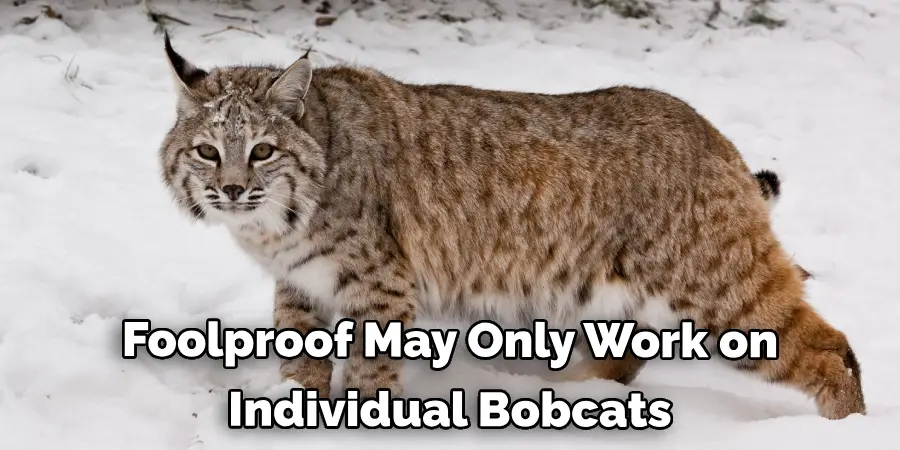
Conclusion
Taking proactive steps to dissuade bobcats from inhabiting your backyard can save you time, money, and energy. Don’t ignore evidence of a possible bobcat presence; quickly secure your land if needed.
Many simple strategies exist to keep these animals away from private property so everybody can implement these techniques on their own terms. Armed with knowledge of what works best for these wild creatures, you can create an environment that discourages them from staying around – all while keeping them safe, too.
As a reminder, invest in motion detector lights and use natural deterrents and pet prevention methods to keep bobcats away from your yard. With the proper planning, anyone can keep themselves out of potential conflicts with nature’s smallest cats!
Hopefully, the article on how to keep bobcats away from your yard has provided you with helpful information and tips. Keep your yard a peaceful haven for humans and wildlife alike.
About
Outdoor Fixes is a distinguished figure in the world of Diy design, with a decade of expertise creating innovative and sustainable Diy solutions.
His professional focus lies in merging traditional craftsmanship with modern manufacturing techniques,
fostering designs that are both practical and environmentally conscious. As the author of diy,
outdoorfixes delves into the art and science of outdoorfixes-making, inspiring artisans and industry professionals alike.
Education RMIT University
(Melbourne, Australia) Associate Degree in Design (Outdoor Fixes) Focus on sustainable design, industry-driven projects,
and practical craftsmanship. Gained hands-on experience with traditional and digital manufacturing tools, such as CAD and CNC software.
Nottingham Trent University
(United Kingdom) Bachelor’s in outdoorfixes.com and Product Design (Honors) Specialized in product design with a focus on blending creativity with production
techniques. Participated in industry projects, working with companies like John Lewis and Vitsoe to gain real-world insights.
Publications and Impact
In diy, Outdoor Fixes his insights on indoor design processes, materials, and strategies for efficient production.
His writing bridges the gap between artisan knowledge and modern industry needs, making it a must-read for both budding designers and seasoned professionals.

